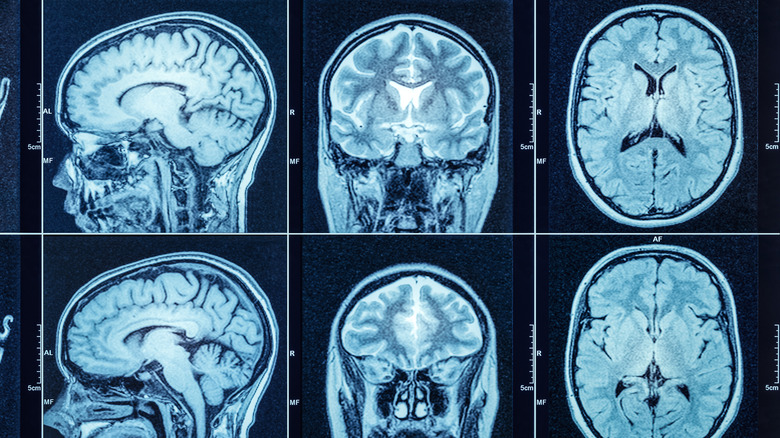Study Finds COVID-19 May Increase Your Risk Of These Three Neurological Conditions
Since the beginning of the COVID-19 pandemic, scientists continue to study the short-term and long-term impacts caused by the virus. COVID-19 is an infectious disease that can affect people of all ages. It has similar symptoms to a common cold, including runny nose, cough, fever, and sore throat (per the National Institute of Neurological Disorders and Stroke). However, It's also possible to be infected with COVID-19 and have no symptoms at all. The virus is most dangerous when it spreads into the lungs, leading to viral pneumonia and lung damage. This disrupts the body's ability to maintain oxygen levels in the bloodstream, causing organs to shut down.
Over the past two years, public health leaders and scientists have developed mitigation efforts to stop the spread of COVID-19, encouraging social-distancing, masks, good hygiene, and vaccines. Despite attempts to slow the spread, COVID-19 has infected more than 540 million people worldwide since 2020 (via World Health Organization).
The long-term impacts of COVID-19 are still being studied, particularly the effects on the nervous system. According to Medical News Today, researchers have observed neurological symptoms associated with COVID-19 including headaches, muscle weakness, and brain inflammation. Further research has determined that contracting COVID-19 can put people at risk for developing irreversible neurological conditions.
Links between COVID-19 and neurological conditions
In a study published by Frontiers in Neurology, researchers found that people who contracted COVID-19 were at risk of developing Alzheimer's, Parkinson's disease, stroke, and bleeding in the brain.
The study was conducted in Denmark, observing more than 43,000 individuals with COVID-19, and about 876,000 people who were COVID-free. Their findings lead to the conclusion that people who tested positive for the virus have a two to three times greater risk of stroke (per Healthline). Researchers also noted higher rates of Alzheimer's and Parkinson's diagnosis one year after infection.
Although there seems to be an increased risk of neurological diseases linked to COVID-19, researchers acknowledge the risks are no higher than those who have been infected with influenza or bacterial pneumonia (via Healthline).
The study has raised concerns, but there are still questions about whether COVID-19 is the cause of some neurological disorders or if the virus triggers pre-existing symptoms. Dr. Rachel Dolhun, the senior vice president of medical communications at the Michael J. Fox Foundation for Parkinson's Research, tells Healthline, "We know that COVID, like any infection, can temporarily worsen symptoms in people who live with Parkinson's. We don't yet know whether COVID can bring on Parkinson's."
Scientists are still examining why COVID-19 attacks the nervous system, and in turn, can damage the brain. As more data is collected and studied, experts say the best way to protect your brain is by keeping it healthy with regular exercise and activity, a healthy diet, and positive social connections.


